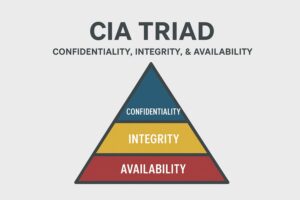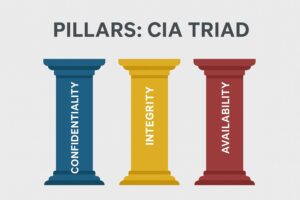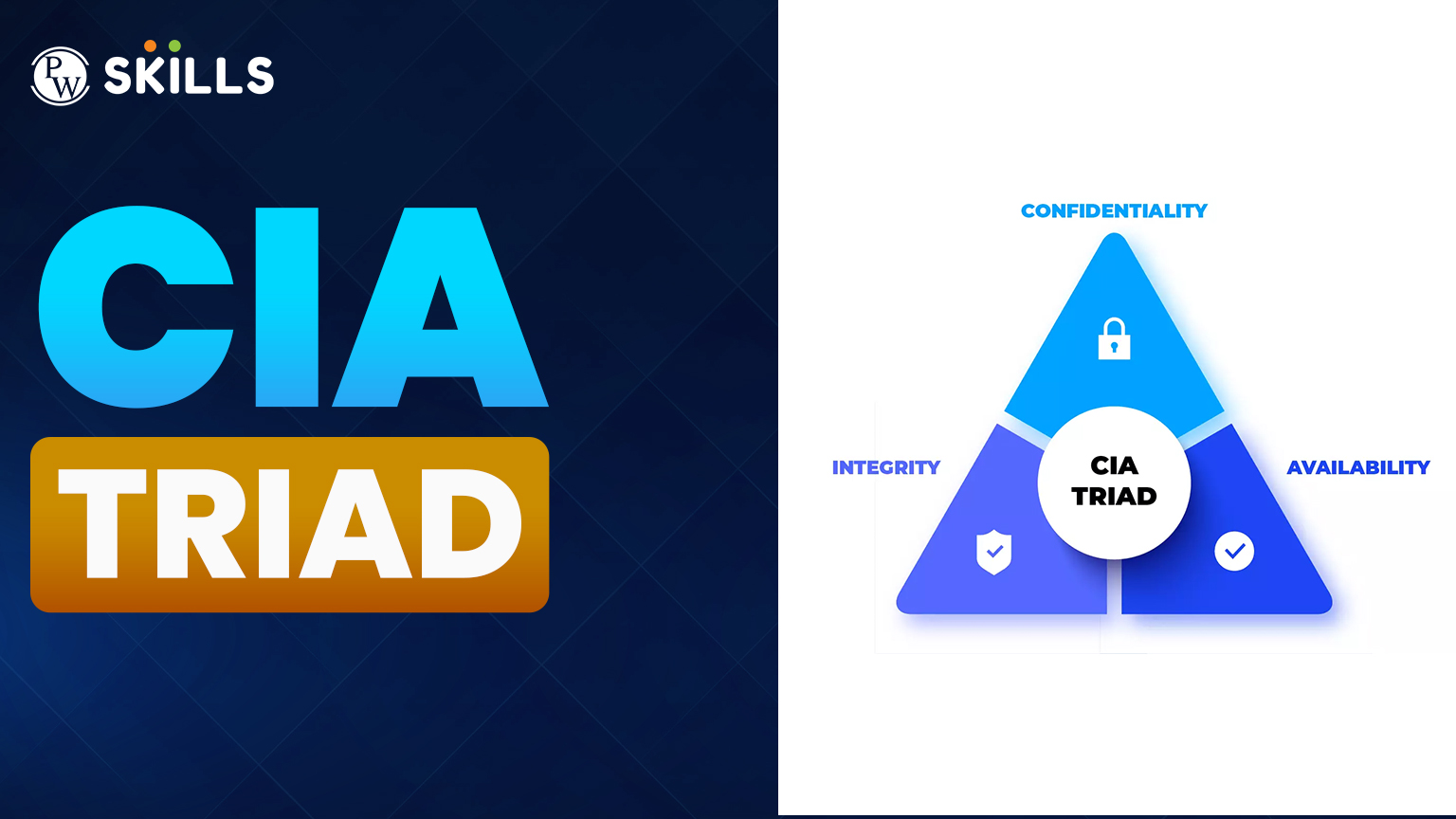Once you dive into the vast and intriguing world of cybersecurity, you are going to hear without fail about CIA Triad. And no, it doesn’t have anything to do with enigmatic secret agents or spies but comes as one of those much more fundamental principles in securing information systems.
The CIA triad—Certainty, Integrity, and Availability—is actually a framework that tells the organizations how they would be able to protect the data from unauthorized access, manipulation, and loss.
It is learning ABC before writing a first sentence for students who are curious about digital security or for someone working on highly sensitive information. Without knowing about the triad, every other aspect of security would be left incomplete.
What is the CIA Triad?
The CIA triad is the basic security model employed to safeguard information and ensure its usability, accuracy, and safety. The three Cs are meant to work hand in hand to establish a well-balanced security strategy:
- Confidentiality: Whose data is restricted from viewing by the unauthorized people.
- Integrity: The assurance that information is intact, correct, consistent, and uncontaminated.
- Availability: Assuring that data can be accessed anytime.

3 Pillars: CIA Triad
The CIA triad framework states confidentiality, accuracy, and accessibility are the three pillars that make a security position of any company.

-
CIA Triad Confidentiality: Safeguarding Secrets
By confidentiality, sensitive information remains safe from prying eyes, perhaps consisting of:
- Personal details, such as those of Aadhaar, medical records, or bank account information.
- Business secrets such as marketing strategies or software source code.
- Some means used by organizations under this CIA triad confidentiality include:
- Encryption to scramble data into unreadable form.
- Role-based access control so employees can only access what they need.
- Multi-factor authentication (MFA) to add extra security layers.
Example: Suppose a hospital keeps patient data without any encryption, and a hacker steals private records. This is an example of confidentiality failure.
-
CIA Triad Integrity – Securing Accuracy and Trust
Integrity is the word that means the information will remain correct and in the same state without modification or tampering. The data with no integrity means wrong decisions taken, loss of finances, or harm done to human life.
To maintain CIA triad integrity, security experts rely on:
- Checksums and hashing algorithms for detection of tampering.
- Digital signatures are used to prove authenticity of data.
- Version control systems provide a way to track changes of files or code.
- Example: A bank’s database is hacked and transaction amounts are changed. Customers lose trust; such is an integrity breach.
-
CIA Triad Availability-Just in Time Access
So, availability is when the data is available to authorized persons exactly when they need it. There can’t be a more secure data store if it is not available at the moment it is needed.
Ways to maintain CIA triad availability:
- Store data in the cloud for re-establishing systems after a crash.
- Use load balancing to prevent server overloads from occurring.
- Disaster recovery plans for emergencies.
- Example: During a festival sale, an e-commerce site crashes due to heavy traffic. Customers can’t shop, resulting in an availability failure.
How the CIA Triad Works Together
The CIA triad is like a three-legged stool; remove one leg and the stool collapses.
- Sensitive data leakages exist without confidentiality.
- Wrong decisions are made in the absence of integrity.
- The system is rendered useless when it is not available.
The goal is a balance- over-partitioning one pillar weakens the rest. Take, for instance, a situation where one concentrates on confidentiality by locking data behind different passwords; availability may become lacking.
CIA Triad in Cyber Security vs Information Security vs Network Security
People often confuse these terms. Here’s how they differ:
| Feature | Cybersecurity | Information Security | Network Security |
| Definition | Protects systems, networks, and data from cyber threats | Protects all types of information (digital & physical) | Focuses on securing data as it moves through networks |
| Scope | Digital security | Digital + physical security | Data transmission & communication |
| CIA Triad Role | Core principle | Strategic framework | Applied to network safety |
A Real-Life Application for the CIA Triad Framework
- Healthcare – To secure the privacy of patients, correctness of medical records, and have their systems available in case of emergencies.
- Finance – Protection of personal bank accounts, prevention of fraudulent transactions, and availability of ATMs 24 hours a day worldwide.
- Government – Key objectives maintaining the confidentiality of the classified data, accuracy in public records, and keeping the essential services accessible.
- E-commerce – Securing payment details, preventing price tampering, and avoiding site downtime.
What is the Opposite of the CIA Triad?
The opposite is often referred to as DAD:
- Disclosure – Leak sensitive data as public.
- Alteration – Unauthorized changes of data.
- Denial – Blocking authorized access.
If DAD takes over, the CIA triplet fails.
Most Common Threats
- Attacks by phishing assault – against confidentiality.
- Ransomware: it’s against availability.
- Manipulation of data – compromises the integrity.
- Overloading servers and hence denial of access.
Case Study of CIA Triad Failure
- WannaCry Ransomware- Holds “availability failure” as it paralyzed all healthcare systems across the globe.
- Equifax Breach: 147 million people’s personal data were revealed (in the confidentiality failure case).
- Stuxnet Worm: “Manipulated industrial control systems to give erroneous readings” (integrity failure).
Myths About the CIA Triad
Myth 1: It is for IT experts only.
Truth: Even non-technical staff must follow CIA principles like password safety.
Myth 2: Loyalty takes precedence compared to either of the other two.
Truth: All three pillars equally weigh its importance when considering a security balance.
Myth 3: The CIA is outdated.
Truth: It is the still core of today’s security even in cloud computing.
Best Practices for Maintaining the CIA Triad
- Train staff against phishing.
- Multi-layer security
- Regular disaster recovery testing.
- Zero trust architecture (validate every access request).
Why Students & Professionals Should Learn the CIA Triad
- Mastering CIA in cyber security also teaches you how to:
- Spot weaknesses in any system before hackers do.
- Devise security strategies for organizations.
- Fast-track your career in ethical hacking, network security, and cloud security.
Also Read:
- Data Security: What Is It and Why It Matters in 2025
- Explore Cyber Security Tutorial: Start Your Career in Cyber Safety (2025 Insights)
- 20 Emerging Cybersecurity Trends to Watch Out in 2025
- Data Encryption Simplified: Everything You Need to Know in 2025
Learn CIA Triad with PW Skills Cybersecurity Course
Master Cybersecurity The PW Skills Cybersecurity Course will teach you about the concepts of the triad and their applications in real life. Learn hands-on tools for threat protection and become job-ready in either ethical hacking, network defense, or digital forensics. This course helps you secure data like a pro, whether you’re new to the field or an experienced professional.
Why CIA ?
The Triad is not mere theory; it is the life force of cybersecurity. Without confidentiality, integrity, and availability, organizations stand to suffer a loss of faith, money, and invaluable data.
Understanding the CIA triad model for students and professionals is, therefore, the very first step towards becoming a true defender in cyberspace.
To learn more about the importance of cybersecurity, you can refer to this blog: Importance of Cybersecurity.
CIA Triad FAQs
Is the CIA triad outdated in the age of AI threats?
No; it's still the foundation: applying the CIA principles in new ways deals with AI threats.
Can the CIA triad be applied to personal devices?
Yes: Lock your phone's data up with passwords, backups, and antivirus software.
Is availability a big deal for businesses?
Very much so for e-commerce and banking, but it's not available at the cost of integrity or confidentiality.
How do beginners practice the CIA triad?
By starting with password management, enabling 2FA, and backing up data regularly.


